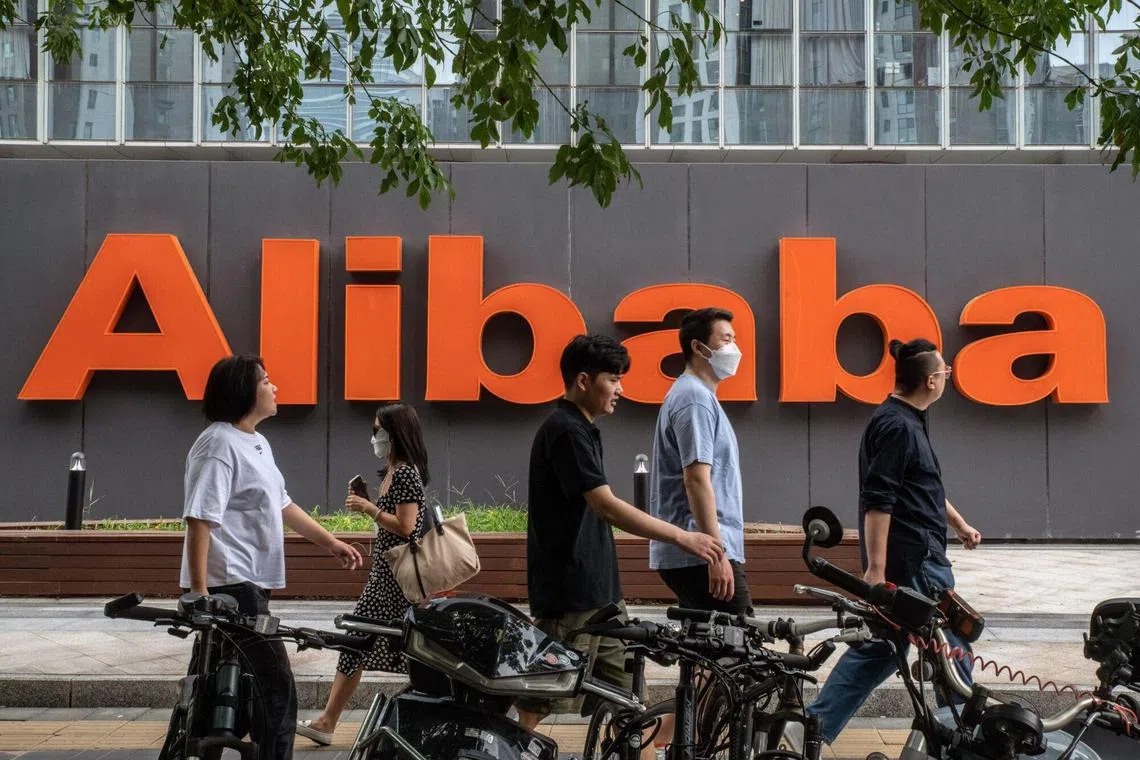Alibaba rockets higher as comeback for Jack Ma’s empire takes hold
Sign up now: Get ST's newsletters delivered to your inbox

Alibaba posted its fastest pace of revenue growth in more than a year in its December quarter.
PHOTO: BLOOMBERG
Follow topic:
BeIJING – Alibaba Group Holding posted its fastest pace of revenue growth in more than a year, as the Chinese internet pioneer co-founded by Mr Jack Ma takes another step towards a recovery after years of turbulence.
The company reported better-than-anticipated revenue gains in its two most important divisions: e-commerce and cloud services, which houses its artificial intelligence (AI) endeavours. That hints at Chinese consumption bouncing back from post-Covid-19 troughs, and initial success at beating back rivals ranging from ByteDance to PDD Holdings that in recent years eroded its market share.
The company’s shares soared almost 14 per cent in Hong Kong on Feb 21. They are up 66 per cent in 2025.
Investors may have also been bullish because of Alibaba’s growing determination to compete in AI. Chief executive officer Eddie Wu said Alibaba will spend more on AI infrastructure over the next three years as it did in the past decade. He went as far as to say that artificial general intelligence, or AGI, is the company’s “primary objective”.
“This is the kind of opportunity for industry transformation that really comes only about once every several decades,” he told analysts on a conference call. “So when it comes to Alibaba’s AI strategy, our first and foremost goal is to pursue AGI.”
The financial results show Alibaba is already righting a business knocked off-kilter by a government clampdown that began in 2020. It regained its footing after Beijing signalled a pullback in scrutiny in 2023. Mr Joe Tsai and Mr Wu – two of co-founder Ma’s most trusted lieutenants – took the helm that year and refocused investment on AI and e-commerce.
On Feb 20, Alibaba reported a faster-than-projected 8 per cent rise in sales to 280.2 billion yuan (S$51.6 billion) in the December quarter, after cloud services revenue expanded its most on a quarterly basis in about two years.
That division, which houses the company’s AI-related projects and hosts computing power for external clients, grew revenue by 13 per cent to US$4.3 billion (S$5.8 billion). International commerce sales – driven by overseas marketplaces such as AliExpress and Trendyol – surged 32 per cent.
Alibaba has gained some US$100 billion of market value in 2025, though it is still far from its pre-crackdown peak. Mr Ma himself joined a select group of the biggest names in Chinese technology and business at a televised summit convened this week by Chinese President Xi Jinping
Mr Li Chengdong, head of Beijing-based internet think-tank Haitun, said: “Now that Alibaba has defended its main e-commerce business, and its side AI business is also booming, we could see Alibaba’s results flourish in upcoming quarters.”
He added: “Their government relationship wasn’t in a good shape in the past few years and that must have led to a huge loss of clients. Now the AI business is finally reviving the group.”
Mr Ma was the highest-profile casualty of Mr Xi’s crackdown on the internet and private sector in 2020, when the authorities scuttled the blockbuster initial public offering of Alibaba affiliate Ant Group.
That episode kicked off a years-long campaign to tighten state control over the economy, rein in the nation’s billionaire class and shift resources towards Mr Xi’s priorities, including national security and technological self-sufficiency. Once one of China’s most outspoken entrepreneurs, Mr Ma largely disappeared from public view.
But the authorities have taken a less combative approach as China’s economy slowed and companies aligned themselves with Mr Xi’s push for leadership in areas like AI. Alibaba, which operates one of the world’s biggest cloud services platforms, wowed investors in 2025 by making major headway in that arena during the post-ChatGPT era.
Mr Jeffrey Towson, partner at TechMoat Consulting, said: “The results show very good progress – a very clear ‘back to basics’ strategy is paying off.”
Since the advent of OpenAI’s chatbot, Alibaba has invested in a clutch of China’s most promising start-ups, including Moonshot and Zhipu. It prioritised the expansion of the cloud business that underpins AI development, slashing prices to win back the customers that fled during the turbulent years. It also decided to spend big on AI, joining a race led by Baidu at the time.
DeepSeek’s sudden rise to global prominence in January – a shock to both Silicon Valley and Wall Street – boosted Chinese tech stocks, including Alibaba, in recent weeks.
Since then, Alibaba has unveiled a Qwen model that performed well in official benchmark tests and signalled the company’s growing relevance in the field. Apple is incorporating Alibaba’s AI technology in its Chinese iPhones, a vote of confidence in its prowess.
On Feb 20, Mr Wu talked up Alibaba’s aspirations to ride the AI wave and develop AGI – the industry holy grail touted by prominent advocates from OpenAI co-founder Sam Altman to SoftBank founder Masayoshi Son.
But like many of his peers, the Alibaba CEO stopped short of outlining a profitable use case for AI. It should, however, enhance services throughout the business, while Alibaba itself as an infrastructure provider should benefit, he said.
“We’re still in very early days when we’re talking about the advancement of artificial intelligence technology,” Mr Wu said.
“The future business models and the future ways in which these models will be monetised are not necessarily clear to anybody today.” REUTERS, BLOOMBERG

